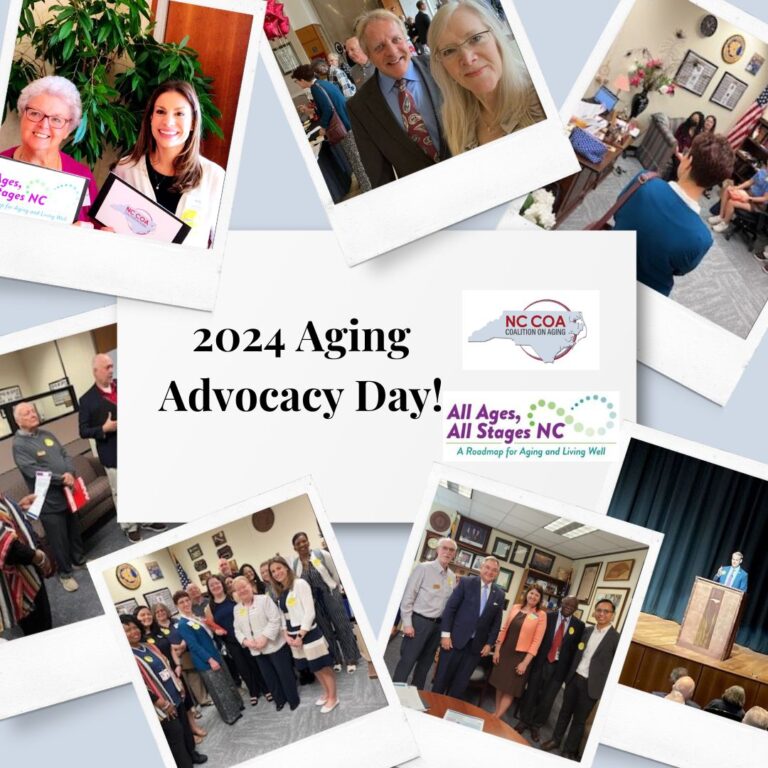Priorities

Our Priorities
Each year after dialogue among its members, the Coalition develops legislative priorities. The issues identified below are the Coalitions priorities for 2025; however, they do not represent the entirety of the issues which the Coalition supports and on which it takes a position. The Coalition typically has a Legislative Advocacy Day in the spring to meet with state legislators to share our priority issues.
2025 Legislative & Public Policy Priorities
North Carolina’s 65+ population is projected to increase from 1.9 million people in 2022 to 2.8 million in 2042 – a 48% increase. During this same period, the 85+ segment of the population, those most likely to need care and support, will grow by a dramatic 114%. In response to these changing demographics, the state has released a Multisector Plan on Aging that will serve as a roadmap for how to address the needs of this growing older adult population. Many members of the Coalition on Aging were heavily involved in the comprehensive Plan development process; therefore, the priority issues of the Coalition reflect many of the recommendations from the Plan.
The issues identified here are the Coalition’s priorities for 2025; however, they do not represent the entirety of the issues which the Coalition supports and on which it will take a position.
Better Position the NC General Assembly to Be Proactive in Addressing the Opportunities and Challenges Posed by an Increasing Older Adult Population
- Establish a Legislative Study Commission on Aging to examine aging issues and annually make recommendations to the NC General Assembly for action.
Strengthen Programs and Services to Help Address the Needs of a Diverse Aging Population
- Help stabilize the health care work force crisis by building on existing initiatives already ongoing in the state and by expanding financial incentives such as loan repayment programs, tuition reimbursements, and stipends to attract and retain health care workers.
- Establish a state-facilitated privately operated retirement savings program for those who do not have a savings option to encourage more state residents to save for retirement.
- Provide funding that helps enable older adults in our state, regardless of where they live, to have access to a continuum of home and community based services and long-term services and supports. Many counties have gaps in services, are not able to provide persons with the level of services needed, or and have waiting lists for many programs. These problems are becoming more acute with funding challenges, including the loss of ARPA funding.
- Support older adults in their efforts to age in place in their homes and communities by increasing funding for housing repairs and modifications, increasing income eligibility and exemption/deferral amounts for property tax relief programs, and boosting affordable housing development through tax credits and low-interest loans to stimulate investments in building and renovating properties.
- Foster a culture of healthy living across the lifespan through support for programs that enhance adult’s health and well-being including multipurpose senior centers and evidence-based health promotion and disease prevention programs such as NC Senior Games, Inc.
Support Family Caregivers Who Provide the Lion’s Share of Care to Frail Older Adults and Persons with Disabilities
- Support programs and services to lessen the caregiver burden such as Project C.A.R.E. (Caregiver Alternative to Running on Empty) which provides respite care.
- Strengthen family leave policies and provisions, including paid and unpaid leave, and provide resources to employers to adopt workplace policies to help employed caregivers.
- Establish a state tax credit for family caregivers to help offset out-of-pocket costs for expenses incurred in caregiving such as home modifications, assistive devices, and personal care items.
Protect Vulnerable Older Adults and Persons with Disabilities
- Pass statutory improvements to the state’s Adult Protective Services Legislation that has not been revised since 1975 which will address gaps in service delivery, update legal frameworks to reflect current best practices, and improve protections for vulnerable adults.
- Appropriate state funding to ensure county departments of social services have the necessary resources to deliver effective adult protective services, including emergency services.
- Rebase the Special Assistance rate which covers the room and board cost for low-income older adults residing in assisted living facilities and is also the eligibility rate for this needed service. The current rate is resulting in many homes no longer taking individuals needing assisted living care because they are ineligible due to their income exceeding the Special Assistance eligibility rate. This results in eliminating the assisted living care option for many older adults and persons with disabilities.